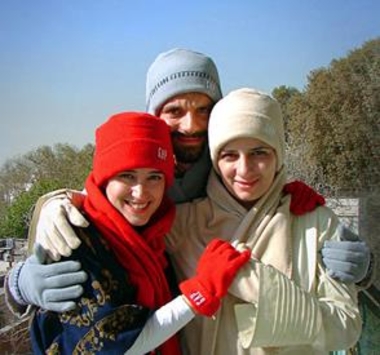Below-zero temps push into Midwest, Northeast

Chicago (AP) — Icy, snow-covered roads and high winds made travel treacherous Sunday from the Dakotas and Michigan to Missouri as much of the nation braced for the next winter wallop: a dangerous cold that could break records.
A whirlpool of frigid, dense air known as a "polar vortex" was expected to suppress temperatures in more than half of the continental U.S. starting into Monday and Tuesday, with wind chill warnings stretching from Montana to Alabama.
It was 5 degrees at kickoff Sunday afternoon inside sold-out Lambeau Field for a playoff game between the Green Bay Packers and the San Francisco 49ers, one of the coldest ever played.
"We suited up, we brought all the snowboarding gear we use ... and added to it," said 49ers fan Jeff Giardinelli of Fresno, Calif. "Without the wind, which isn't here yet, we're good. When it gets windy, we'll be ready for it."
The forecast is extreme: 25 below zero in Fargo, N.D., minus 31 in International Falls, Minn., and minus 15 in Indianapolis and Chicago. Wind chills — what it feels like outside when high winds are factored into the temperature — could drop into the minus 50s and 60s. Northeastern Montana was warned of wind chills up to 59 below zero.
"It's just a dangerous cold," said National Weather Service meteorologist Butch Dye in Missouri.
Several Midwestern states received up to a foot of new snow Sunday. Five to 9 inches fell in the Chicago area by Sunday afternoon, St. Louis area had about a foot of snow and northern Indiana had at least 8 inches. Central Illinois braced for 8 to 10 inches, and southern Michigan could see up to 15 inches.
Officials closed several Illinois roadways because of drifting snow and warned residents to stay inside. Roads in the Midwest were particularly dangerous, and officials in Missouri said it was too cold for rock salt to be very effective.
Authorities also urged people to check on elderly and disabled relatives and neighbors.
In Chicago, temperatures were expected to bottom out around minus 15 overnight, likely setting a daily record, National Weather Service meteorologist Ed Fenelon said. Earlier Sunday, temperatures sank to minus 20 and colder in northern Minnesota and Grand Forks, N.D.
It hasn't been this cold for almost two decades in many parts of the country. Frostbite and hypothermia can set in quickly at 15 to 30 below zero.
Lorna West, a 43-year-old student and consultant from Columbus, Ohio, said she doesn't believe people unaccustomed to such weather are ready for what's coming.
A Chicago native, she said thermal underwear, lots of layers and "Eskimo coats" with zipped hoods to block the wind were the norm growing up.
"And don't go out if you don't have to," she said.
In Michigan, residents jammed stores to stock up on supplies.
"I made my husband go grocery shopping last night," said Kim Tarnopol, 46, of the Detroit suburb of Huntington Woods. Tarnopol was picking up cold medicine Sunday for her daughter Emma at a CVS in nearby Berkley, Mich.
Travel problems started early Sunday. In New York City, a plane from Toronto landed at Kennedy International Airport and then slid into snow on a taxiway. No one was hurt, though the airport temporarily suspended operations because of icy runways.
About 1,200 flights had been cancelled Sunday at O'Hare and Midway international airports in Chicago, aviation officials said, and there also were cancellations at Logan International Airport in Boston and Tennessee's Memphis and Nashville international airports.
School was called off Monday for the entire state of Minnesota, as well as cities and districts in Wisconsin, Illinois and Indiana and Iowa, among others. Chicago officials said school would be in session for the nation's third-largest district, though absences would be excused.
Southern states are bracing for possible record temperatures, too, with single-digit highs expected Tuesday in Georgia and Alabama.
Temperatures are expected to dip into the 30s in parts of Florida on Tuesday. But Florida Citrus Mutual spokesman Andrew Meadows said it must be at 28 degrees or lower four hours straight for fruit to freeze badly.
In western Kentucky, which could see 1 to 3 inches of snow, Smithland farmer David Nickell moved extra hay to the field and his animals out of the wind. He'd also stocked up on batteries and gas and loaded up the pantry and freezer. The 2009 ice storm that paralyzed the state and knocked out power to hundreds of thousands of people is fresh in his mind.
"We are hoping this isn't going to be more than a few days of cold weather, but we did learn with the ice storm that you can wake up in the 19th century and you need to be able to not only survive, but be comfortable and continue with your basic day-to-day functions," Nickell said.
In Mt. Prospect, Ill., Steve White spent part of Sunday raking his roof with a specially made pole to prevent icicles as he prepares for a trip to Costa Rica in the coming days. He also installed a thermostat that directly faces a window, so a neighbor can check to make sure his furnace is working.
"I'm just glad I'm here to take care of it," he said.
___
Associated Press writers Julie Smyth in Columbus, Ohio; Tom Coyne in Indianapolis; Jim Salter in St. Louis; Brett Barrouquere in Louisville, Ky.; Verena Dobnik in New York City; David N. Goodman in Berkeley, Mich.; and Christine Amario in Miami contributed to this report.
by Kerry Lester, Associated Press
Tammy Webber, Associated Press
Copyright 2014 The Associated Press. All rights reserved. This material may not be published, broadcast, rewritten or redistributed.
The Gayly – January 5, 2014 @ 5:20pm





